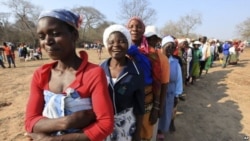Food insecurity in Zimbabwe is threatening people living with HIV/AIDS, and the situation is dire as the number of vulnerable locals in desperate need of food assistance is rising every day.
Some people living with HIV/AIDS say it is now difficult to take prescribed antiretroviral drugs without getting adequate food
Some international organizations like the World Food Program say the number of people in need of food assistance in Zimbabwe is now estimated at 2,4 million. Earlier projections had put the figure at 1,5 million.
Indications are that up to 3 million people may need of food aid in the country with a huge grain deficit.
Manicaland province is one of the regions devastated by the current dry spell being fueled by the El Nino weather phenomenon, which has brought intensive heat in most parts of the country resulting in the wilting of crops due to moisture stress.
Thousands of cattle have succumbed to the devastating drought that has left millions of Zimbabweans struggling to have a decent meal per day. The worst affected are people living with HIV/AIDS, who need at least three meals a day.
Rosemary Sauti of Sakubva suburb says unlike in the past when they did part-time jobs, they can’t even manage to get a dollar per day to buy food due to the high unemployment rate in the country.
“There is no food and the people are suffering as they are faced with the challenge of getting something to eat. It becomes serious when neighbours know your status and they stigmatize you and you are denied food in the end.”
Another Mutare resident, who only identified herself a Elizabeth and has been living with HIV for almost a decade, says it is impossible for most of them to have a balanced diet of African dishes as prescribed by local doctors.
“Those nutritious foods are very important for people living with HIV/AIDS; why because the tablets taken require that one eats nutritious foods for good health and their absence spells doom and death for the person,” she says.
Elizabeth, who is also local caregiver in Chikanga’s Ward 16 in the city, says a balanced diet is important for a person taking anti-retroviral therapy as it boosts white and red blood cells.
“The nutritious food aids in one boosting the body to get to its optimum normal being and be safe from other diseases that take advantage of one’s condition or opportunistic ailments.”
Casper Pound is the coordinator of the Family Aids Support Organisation, which has over 5,000 people living with HIV/AIDS in Manicaland province.
He says the hunger situation is critical for their members.
“Currently the members are suffering as they do not have food and money to use to buy the food and as a result as far as adherence of ART is concerned they won’t be able to adhere as they spend much of their time trying to look for someone to give them food and working for it. So, we are faced with another challenge of reaching a global target on attaining an HIV free generation by 2030 when we have food insecurity.”
Pound says non-governmental organizations and the state must now direct their efforts on ensuring that all vulnerable groups have food security and advanced nutrition levels to avert disaster in most households across the country.
“My appeal is that the government and the National AIDS Council should ensure that nutrition in ART is supported throughout as it is great on paper but in practice that has not been the case. We have seen many people on ART not getting the supplementary nutrition particularly now.”
Manicaland is one of the provinces hard hit by the drought, which has also devastated Matabeleland, Masvingo and several others.
Members of the National Assembly - Prosper Mutseyami and and Enock Porusingazi of Musikavanhu and Chipinge South constituencies - appealed to the government recently to quickly move in to avert a hunger crisis in their regions that fall under geographical natural region 5.
President Robert Mugabe has declared a state of disaster in Zimbabwe following the devastating drought. Zimbabwe needs $1,5 billion for food aid. The country has been importing maize from Zambia, Malawi and South Africa.






